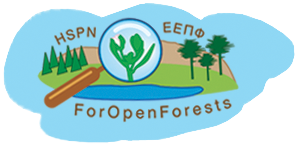Main menu
Conservation of priority forests and forest openings in "Ethnikos Drymos Oitis" and "Oros Kallidromo" of Sterea Ellada, LIFE11 NAT/GR/1014
Actions
Action C.7: Ex situ conservation and propagation of keystone species of target habitats

This action includes the creation and function of a seedbank of the keystone plant species of the target habitats, and the propagation of these species to plant for habitat restoration. The action will start at the first year of the project.
Collection of genetic material (seeds or ramets) of the keystone species of the target habitats of temporary ponds (3170*), mountain grasslands (6210* and 6230*), Juniperus foetidissima forests (9560*), and Pinus nigra forests (9530*):
The species and reproduction units to be collected for all habitats, except from 9530*, will be determined by actions A.3, A.5, and A.7. For the habitat 9530* Pinus nigra seeds will be collected. Collections will take place in the appropriate season for each plant species, and will be repeated for at least 3–4 years for the needs of plant replenishment at the project restoration sites (actions C.2, C.4, and C.5), and also because, in some species, the annual seed production is occasionally null or diminished.
Collections will start during the first year of the project with three rare plants typical of the temporary ponds: Veronica oetaea*, Myosurus minimus, and Ranunculus lateriflorus. The seeds or ramets of all species will be collected from more than one local populations on Mt. Oiti and Mt. Kallidromo, so as to achieve seed lots with maximum genetic diversity which will provide plants adapted to local conditions. Collection will be done either manually, for most herbs and shrubs, or by telescopic scissors for tall or inaccessible individuals or, where possible and appropriate, by gasoline aspirators or lawnmowers. The genetic material will be properly treated and stored or cultivated according to International Standards. Seed cleaning, separation and sorting will be done manually at the Seedbank of the UoA or at the faciities of NAGREF, as necessary.
Seeds of all species will be stored at the Seedbank of the UoA and other ramets will be stored at the “Alexander and Ioulia Diomedes Botanical Garden” in Athens. Germination treatments for the production of seedlings, where necessary for dormant seeds, will be administered at the facilities of the UoA. Cultivation of plants to be used for restoration (actions C.4 and C.5) will be done at the facilities of the “Alexander and Ioulia Diomedes Botanical Garden’. Before planting at the restoration sites the young plants will be transferred at the Botanical Garden of the Natural History Museum of Oiti for acclimatization to local conditions.
Note: There is no overlap between actions C.2 and C.7 regarding reintroduction of Veronica oetaea*. Action C.7 includes seed collection and storage, as well as seed germination testing to obtain information regarding the optimal germination conditions and timing of germination. Action C.2 includes sowing of the collected seeds at the reintroduction sites in the way and timing indicated by actions C.7 and A.4.
Ex situ conservation of genetic material is a complement of in situ conservation, necessary in order to provide long-term insurance against catastrophic events, and to facilitate plant re-introduction or population enhancement when necessary. For instance, after the destructive fires of 2007 in Greece, the reforestation of Pinus nigra forests was extremely difficult due to the lack of available seeds.
In addition, this action will provide the plant material to be used in the restoration actions of the project (actions C.2, C.4, and C.5).
- Seed-lots of all of the keystone species stored in the UoA Seedbank.
- Production of the plant material to be used for restoration of the target habitats.
- A manual with protocols for seed collection, handling, storage and seed germination, for the keystone species of all the target habitats.
- A manual with guidelines for plant growth and outplanting for the keystone species of habitats 3170* and 9560*.



 news
news









